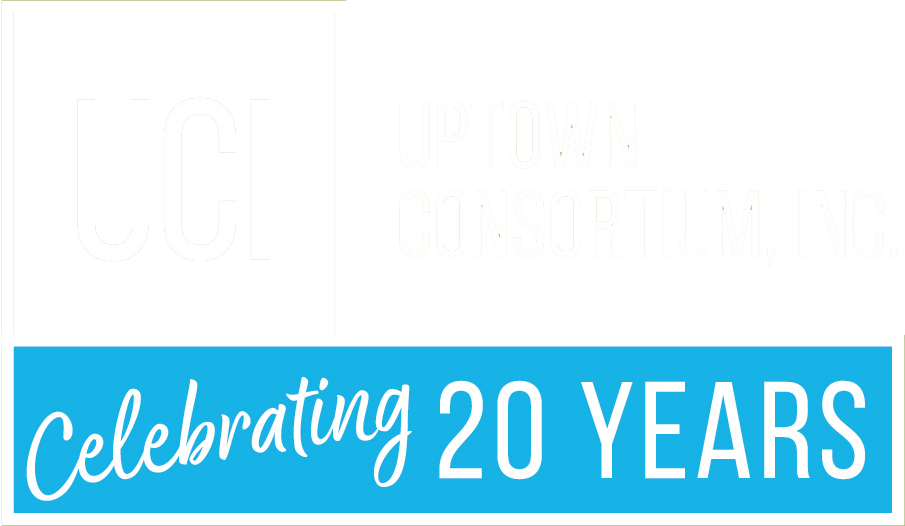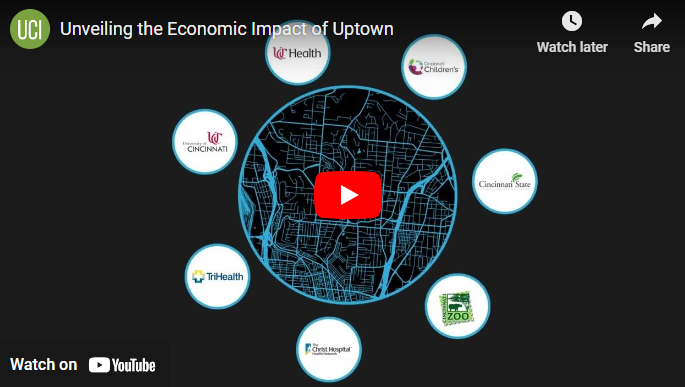Uptown sits in the middle of Cincinnati, up the hill from Downtown. It’s become a place defined by the convergence of innovation, redevelopment and inclusion that are drivers for future growth for the city and the five neighborhoods that provide its footprint––Avondale, Clifton, Corryville, CUF (Clifton Heights, University Heights and Fairview) and Mt. Auburn. It is one of the most vibrant parts of the Queen City.
The University of Cincinnati Economics Center (UCEC) has completed an updated study of Uptown's economic impact on the Cincinnati Metropolitan Area and the State of Ohio. The results show that the impact is “significant,” likely largely driven by job density across the area.
“A lot of the jobs in Uptown, you must be in the office. Research and health care jobs and on-campus teaching are all done in person,” Brad Evans said. Evans is UCEC’s Co-Executive Director and Director of Research.
About the Study
Evans and his team looked at 2023 data, including the annual monetary and fiscal effects of anchor institutions, which include Uptown’s largest employers and UCI’s four Member institutions (Cincinnati Children’s Hospital Medical Center, Cincinnati State Technical and Community College, the Cincinnati Zoo & Botanical Garden, The Christ Hospital, TriHealth, University of Cincinnati and UC Health). The study also accounts for the economic impact of the 1,063 auxiliary businesses in Uptown.
Key Insights
Overall, anchor institutions located both in and outside of Uptown and auxiliary businesses in Uptown contributed the following total impact:
Total Economic Impact = $24.5 billion
Jobs = 176,871
Earnings = $9.8 billion
Anchor institutions and auxiliary businesses inside Uptown contributed the following direct impact:
Direct Economic Impact = $10.7 billion
Jobs = 74,521
Earnings = $5.2 billion
Further Comparison
The study also compared Uptown's economic growth from 2002 to 2022, finding that the neighborhoods have grown considerably. Employment in Uptown is up 28.8 percent, compared to relatively flat employment in the City of Cincinnati (-5.2 percent) and statewide (-0.2 percent). Wages have also increased 17.2 percent, just topping Cincinnati’s wage increase (14.9 percent) and Ohio’s wage increase (9.5 percent).
“Uptown is on a path that UCI, its members, and the other anchor institutions in Uptown have envisioned for the past two decades. The results of this economic impact study illuminate a strong foundation that's in place to continue to allow for growth, ultimately creating a fruitful future for the five neighborhoods that define Uptown and the Cincinnati Metropolitan Area,” said UCI President and CEO Beth Robinson.
Uptown Residents are Younger
The study also looked at the people who call Uptown home. In total, 48,100 people live in Uptown. Of the neighborhoods in Uptown, CUF has the largest population of residents with 17,700 people. The Economics Center used 2022 data from the US Census Bureau to analyze the demographics of Uptown residents as compared to the rest of Cincinnati. Uptown residents are younger given the high concentration of students (average age 29 vs 33), more educated (45.3% vs 40.5% with bachelor’s or higher) yet have less household income on average ($63,100 vs $80,000) than the rest of Cincinnati.
Future Growth
There is no doubt Uptown is poised for both immediate and long-term future residential and economic development growth. UCI and its partners are leading several development projects in Uptown at MLK & Reading Road and Burnet Avenue. The UC Economics Center found that these projects are estimated to contribute $2.0 billion to the Cincinnati Metropolitan Area economy, earn $815.4 million annually and create 7,806 jobs.
The study concluded that “Uptown anchor institutions and auxiliary businesses contributed substantially to the Cincinnati MSA… and also represent a substantial portion of local employment [in the City of Cincinnati].” The economy, property values, and declining vacancies remain strong, and Uptown is poised to continue its rapid growth with investments and future developments.
For more information about the study, please email Brooke Rapp at brapp@uptownconsortium.org.
To learn more about Uptown’s growth and future projects, sign up for Uptown Updates on UCI’s website and follow Uptown Consortium, Inc. on LinkedIn and Facebook.

